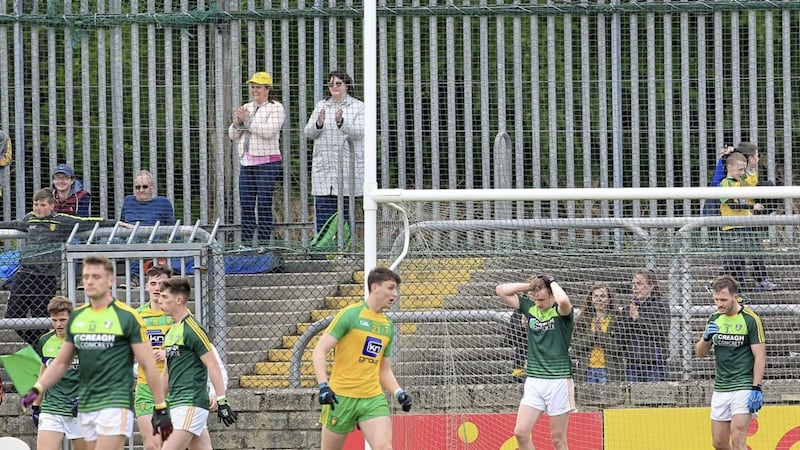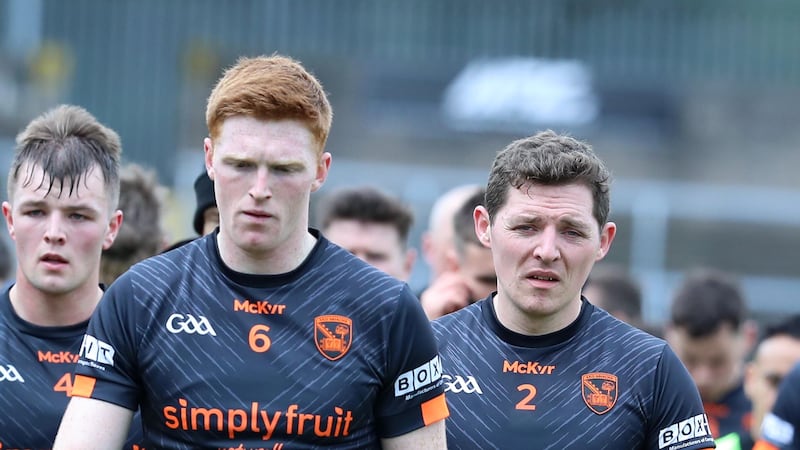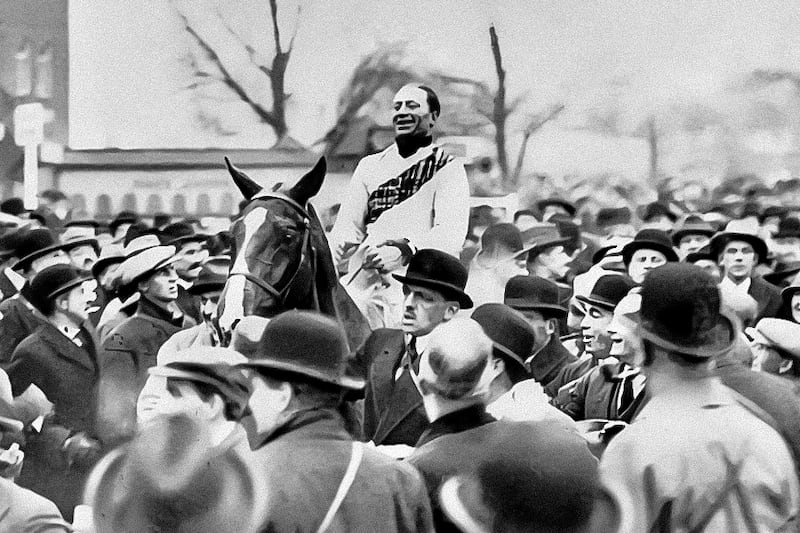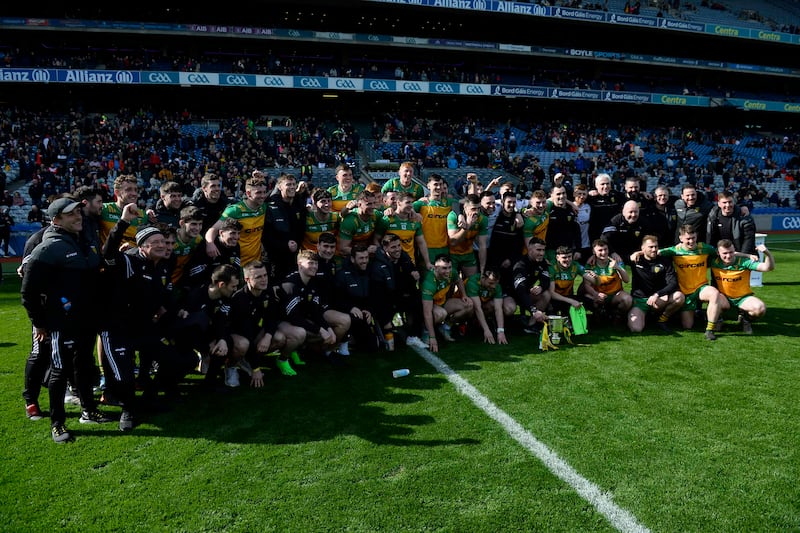LONG before the end of the senior match in Ballybofey on Sunday, discussions in the pressbox had turned to various subjects other than what was happening out on the pitch.
Pubs in Carryduff.
The serial killer hairstyle of a particular Antrim substitute (not a conversation instigated by me, it must be pointed out).
The fact that Gerry McLaughlin had never heard of a lanyard, and only found out because he was wondering what exactly was swinging round his neck.
Had we stopped talking we might even have been able to hear various random conversations coming up from the MacCumhaill Park terraces.
A crowd of just over 10,000 wasn't bad in the circumstances, but it produces a hum rather than roars as the gap between teams grows on the scoreboard.
The late Joe Lennon, Down's All-Ireland winning captain in 1968, wrote a thesis for DCU in 1999 entitled `Towards a philosophy for legislation in Gaelic games'.
In it, he noted: "From his experience in analysing games for the purposes of commenting on their technical merit, the writer has come to the conclusion that a game in which scores are always close, where the lead changes often, where good chances are missed and improbable scores or saves recorded, and where plenty of dramatic incidents occur seem to merit the praise of the media more than those games where there is a higher content of technically good play and good behaviour but where the result may not be in doubt for much of the game.
"In this respect, the games are seen as entertainment where drama is a critical component."
Many suggest that the modern style of football is the cause of dwindling attendances, but lack of competitiveness is arguably a greater factor.
Despite the waning interest in Donegal's demolition of Antrim, there wasn't any chat about the final day of the English Premier League.
No one sensible (or not employed in the competition's marketing) seriously suggests any more that the English Premier League is 'the best league in the world', certainly not as regards the standard of football.
However, the claim is still often made that it's the best in terms of depth of competition, that 'on any given day any team can beat any other.'
In truth, that doesn't bear much scrutiny either.
Interestingly, there are effectively three tiers within the English top flight – the top six (or seven, Everton might argue), the middle seven (or six), and the bottom seven.
And if you look at that top six they mostly beat each other, with losses to lower teams very rare indeed.
Champions Chelsea's conquerors were Spurs, Liverpool, Arsenal, Manchester United - and Crystal Palace.
Runners-up Spurs lost only to Chelsea, Liverpool, Manchester United - and West Ham (who happen to hate Spurs).
Manchester City lost to Chelsea (twice), Spurs, Liverpool, Everton - and Leicester.
Liverpool were the anomalies in the top four, losing to Burnley, Bournemouth, Leicester, Palace, Swansea, and Hull, all of whom finished in the bottom half except for Bournemouth.
Manchester United lost to City, Chelsea, Spurs, Arsenal – and Watford.
Even Arsenal mostly lost to top teams – Spurs, Chelsea, Liverpool (twice), City, Everton, albeit with defeats to Watford, Palace, and West Brom contributing to their downfall.
In terms of keeping crowds – and levels of interest - up, soccer has the advantage that it is a much lower-scoring game than Gaelic football.
Consequently, Championship shocks for the big guns in the GAA are few and far between too.
Dublin's only losses over the past six seasons have come against Donegal and Mayo.
Kerry have only been beaten by Dublin (three times), Donegal, and old rivals Cork over the same timeframe.
Mayo have lost out seven times in six seasons, again three times to Dublin, twice to Kerry, and once each to Donegal and local rivals Galway.
Donegal's defeats have been against Dublin (twice), Kerry, Tyrone, Mayo (twice), and Monaghan (twice).
Tyrone have lost four times to Donegal, twice each to Mayo and Kerry, once each to Monaghan and Dublin – and once to Armagh, another set of local rivals.
Monaghan suffered the only true shock, their home loss to Longford last summer; otherwise their conquerors since Malachy O'Rourke took them over have been Donegal (twice), Tyrone (twice), and Dublin.
There'll always be a hardcore support who'll watch their county no matter what, but it's increasingly hard to attract the floating fans.
They will vote with their feet, save their hard-earned cash for the matches that really matter, not foregone conclusions.
The GAA hierarchy has quite understandably expressed concern about falling attendances.
One solution is that introduction of the 'Super Eight' stage in place of All-Ireland Football quarter-finals next year, with the expectation that more major matches will attract bigger attendances and greater sponsorship.
That's a fair assumption, although there could also be 'dead rubbers' depending on how the group schedules pan out, with little interest in such meaningless matches.
One aspect of the 'Super Eights' that could boost the provincial championships is that the only way to guarantee a place in the former is by winning the latter.
Yet no county ever goes out to lose a match, so the more likely consequence is that the big guns will be even more determined not to slip up.
The lesser lights will continue to be knocked out and overshadowed – unless they create greater change than merely a format that is really geared towards the top teams.
The best way to guarantee good attendances is to put on games that will, probably, be closely-fought, competitive (like in the National Football League).
If you put fairly well-matched teams together you'll generally get close, competitive games, the outcomes of which are arguably unpredictable.
Games that will attract big attendances and considerable interest.
The 'Super Eights' might boost the overall attendance figures, but the sense is that crowds will continue to dwindle for other games, especially for mis-matches.
The change that the GAA really needs is to move to at least two tiers, perhaps three, with promotion and relegation in between. Now you're talking.








